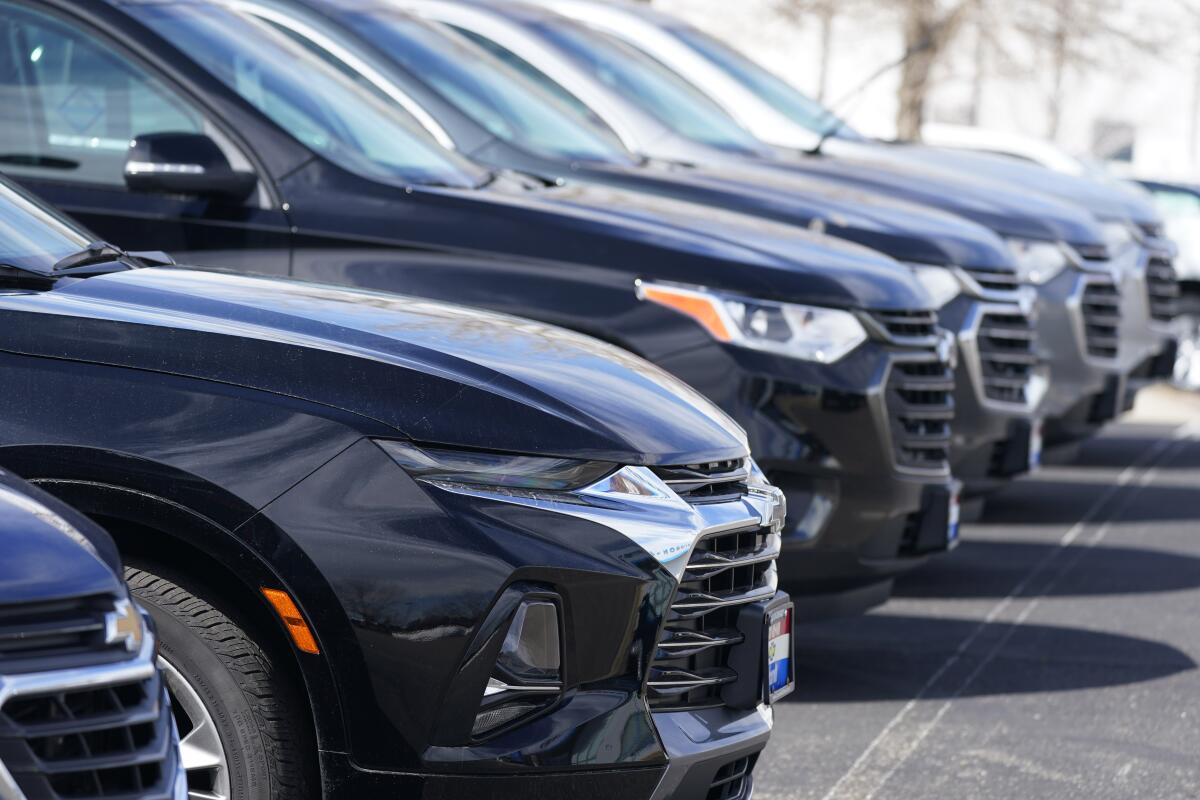Auto sales jump compared with last year’s COVID-stricken first quarter

Automakers posted higher sales in the first quarter as General Motors Co., Toyota Motor Corp. and others benefited from strong demand for new cars and trucks in comparison with a year earlier, when the spread of COVID-19 shut showrooms.
U.S. auto sales for the quarter surged more than 8%, according to analysts’ estimates. The gain reflects buying as vaccination rates increase and more people return to their pre-pandemic routines. Increased confidence in the economy, along with worries about lower supplies of cars due to computer chip shortages, also helped boost deliveries.
Major carmakers either met or handily beat consensus forecasts of analysts, most of whom projected quarterly gains compared with the disastrous performance in the first quarter of last year.
“Everybody is up because March last year was a train wreck,” Judith Wheeler, Nissan Motor Co.’s vice president for U.S. sales, said in an interview. “For the overall industry, we expect it to be a very good year.”
If Americans don’t flock to crossover EVs like the new Volvo C40 Recharge, it’s hard to see how green-car mandates can be met.
SUV split decision
GM’s sales climbed 3.9% in the quarter, led by demand for sport utility vehicles such as the midsize Chevrolet Traverse and full-size Cadillac Escalade. Strength in deliveries of those models helped offset lower sales of vehicles such as the Chevy Equinox and GMC Terrain compact crossover SUVs, which have been affected by temporary shutdowns of plants in Mexico and Ontario, Canada.
Despite semiconductor scarcity that is prompting factory closures, GM expects a solid year of growth. It projects the annualized selling rate for the industry will hit 16.7 million vehicles, which is above analysts’ average estimate of 16.5 million.
“Consumer confidence and spending will continue to increase due to stimulus, rising vaccination rates and the progressive reopening of the economy,” Elaine Buckberg, GM’s chief economist, said in a statement. “Auto demand should remain strong throughout the year.”
Stellantis, formerly known as Fiat Chrysler, posted a 5% gain for the quarter. Ford Motor Co. saw a slight uptick of 0.6%. Both automakers benefited from strong demand for their pickups and SUVs. Stellantis’ Ram 1500 pulled ahead of GM’s Silverado model, becoming the bestselling truck behind Ford’s industry-leading F-150.
Ram outsold the Chevrolet Silverado by more than 22,000 units after Chevy won the No. 2 truck spot in 2020. That may be a matter of supply: Chevrolet has been eliminating truck options from its assembly lines to keep production going, and Stellantis has plenty of extra inventory of its Ram Classic, the older, more affordable version of its Ram 1500.
All three Detroit automakers have struggled to hoard enough chips for their most profitable models. Stellantis said last week it would close half its plants in North America, and Ford said Wednesday that it has to idle a pair of F-150 factories.
Not enough chips
The global semiconductor shortfall is draining dealer lots of cars and trucks — and causing buyers to pay more to secure a new set of wheels. New-model inventory available at U.S. dealerships fell 36% in March while average transaction prices rose 5% to an estimated $40,563, according to automotive researcher Edmunds.
“The stronger sales results are bumping against ongoing production issues, creating what could be a volatile demand environment over the next few months,” Chris Hopson, manager of North America light vehicle forecast for IHS Markit, said in a statement.
Sales of Toyota’s full-size Tundra pickup were flat in March compared with a year earlier, reflecting a prolonged shutdown of its assembly line at a plant in San Antonio. Never the most popular vehicle in the automaker’s lineup, the Tundra has borne the brunt of the semiconductor shortfall.
But overall, Toyota reported a healthy 22% jump in quarterly sales — including an 87% surge in March — to 603,066 vehicles. Buyers flocked to its bestselling RAV4 crossover SUV and popular Tacoma midsize truck. The Japanese company’s Lexus luxury brand reported its second-highest volume ever for the first quarter and its best ever for March, led by sales of the RX sport utility vehicle.
Fleet business due for a rebound?
The auto industry has retail buyers to thank, since multi-vehicle corporate clients largely disappeared at the height of the pandemic and have remained bit players in recent months. Fleet purchases — often at discounted rates — fell about 30% in the first quarter, according to analysts’ estimates.
That reflected lower demand from rental car companies and other fleet buyers, as well as dwindling vehicle supplies as automakers prioritized higher-margin retail sales. But there are signs that the fleet business may be close to bottoming out.
“I can tell the economy is starting to rebound because our rental car partners are really aggressively asking us for more vehicles,” Randy Parker, Hyundai Motor Co.’s top sales executive in the U.S., said in an interview. “What that tells me is the rental car side of the business is really starting to pick up.”
Hyundai’s deliveries rose 28% in the first quarter to 167,130 vehicles, with the Tucson compact SUV leading the way. But fewer than 10,000 of those vehicles went to fleet buyers.
Nissan is also optimistic that multi-vehicle buyers will start to become more of a presence in the sales picture.
“Fleet is definitely coming back. We will try to do our part to give them some inventory, but we’re going to focus on retail,” Nissan’s Wheeler said.
Nissan ends its losing streak
Nissan reported a gain for the first time in nine quarters, with a 10.8% increase to 285,553 vehicles. A 45% jump in deliveries of the Japanese automaker’s Rogue crossover SUV accounted for almost one-third of total deliveries as the brand attempts to rebuild. Unlike its upscale competitors Cadillac and Lexus, Nissan’s Infiniti brand saw no upswing: Sales crashed 25% to fewer than 20,000 vehicles.
Honda Motor Co., its rival, posted a 16% increase in first-quarter deliveries to 347,091 vehicles and set a new March sales record. Demand for Honda’s bestselling CR-V crossover SUV more than doubled in March. Buyers also took a shine to a refashioned Ridgeline pickup, with sales more than tripling last month.
Electric-vehicle market leader Tesla Inc. has not provided guidance on when it will release its first-quarter sales numbers.
Established automakers have vowed to crack Tesla’s lock on EV sales, and investors have warmed recently to their ambitious plans. In one early sign of progress, Ford reported a 74% jump in EV sales, driven by demand for its battery-powered Mustang Mach-E and new gas-electric hybrid F-150 pickup.






